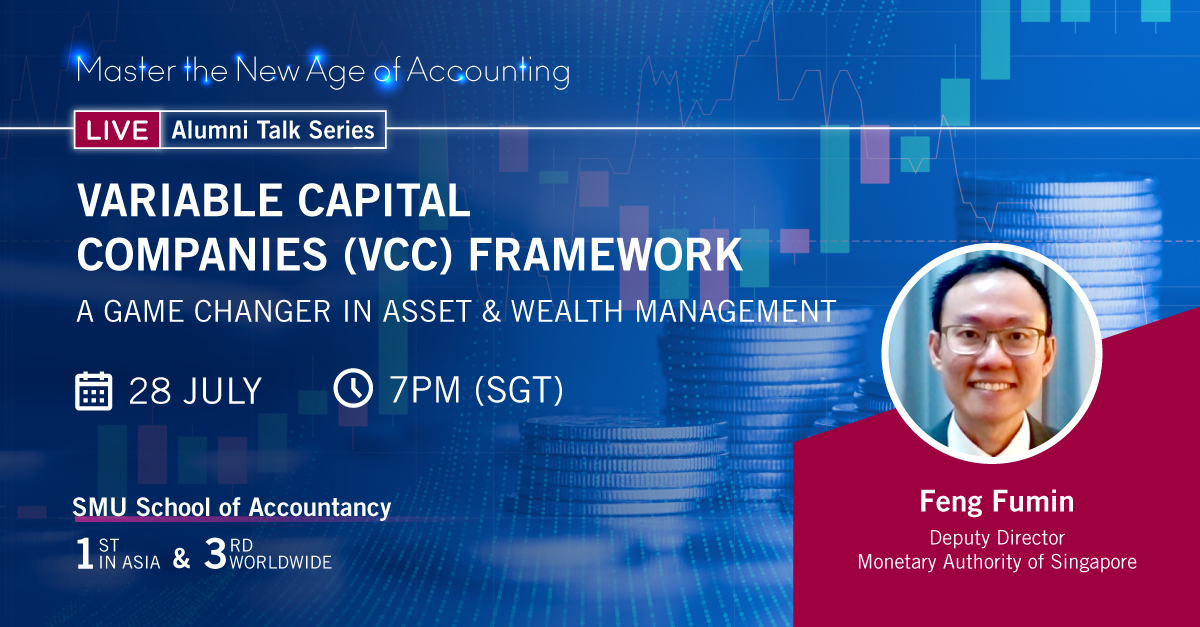Earlier this year, the Monetary Authority of Singapore (MAS) and the Accounting and Corporate Regulatory Authority (ACRA) launched a new corporate structure - the Variable Capital Companies (VCC) Framework. Considered to be a game-changer in the asset management industry, the VCC provides more flexibility and will complement the existing suite of investment fund structures available in Singapore.
Despite the unprecedented economic situation as well as the uncertain global outlook given the Covid-19 pandemic, the recent MAS annual report press conference, provided an update that the first half of the year showed financial services grow by about 5%, which is a faster growth compared to last year during the same period. With Singapore’s financial sector continuing to perform very well compared to the rest of the economy, the introduction of the VCC will allow Singapore to elevate its position as a prominent funds’ hub.
Feng Fumin, a Deputy Director with MAS, graduated with a Master of Professional Accounting at the Singapore Management University (SMU), leads the development of the Variable Capital Companies (VCC) framework at MAS, a project he has been working on since his graduation in 2017. He shares with us why the introduction of this new investment fund structure is an important milestone for Singapore’s asset management industry.
Positioning Singapore as a Fund Domicile Hub
Under the Industry Transformation Map launched in 2017, MAS wanted to position Singapore as the Asian hub for fund management and domiciliation. And the key initiative under this pillar was the development of the new VCC framework to enhance Singapore’s value proposition as a full-service fund domiciliation centre.
The intent and motivation to create this new structure were twofold. Firstly, while Singapore was a leading fund management hub with a diverse base of fund managers, many investment funds managed by Singapore-based fund managers are domiciled overseas. Hence, having a bespoke investment fund structure will allow Singapore-based fund managers to co-locate their fund management and domiciliation activities in Singapore, so that the full potential value chain of asset management which includes funds structuring and servicing can be captured in Singapore. And secondly, there were limitations in terms of features for existing structures such as the company structure where it is used as an investment fund.
To remain competitive and to keep pace with regional funds hubs, Singapore developed a corporate structure that is attractive for fund managers to domicile their investment funds in Singapore. And the launch of the VCC framework is set to provide more business collaboration opportunities between fund managers and fund service providers.
And with increasing activities in the fund’s ecosystem, there will be good jobs created for Singapore-based professionals including roles that provide custody services, fund administration, accounting, legal, compliance, tax advisory as well as fund directorship.
How does VCC benefit Singapore?
Feng highlighted that when designing the VCC framework, MAS had incorporated the best-in-class features which are on par with the investment structures that are available in leading fund jurisdictions such as the OEIC – the Open-Ended Investment Company in the UK, and it resembles the SICAVs in Luxembourg as well as the popular offshore Cayman Segregated Portfolio company.
The benefits of VCC include greater flexibility and improved operational and tax efficiency, thereby facilitating investment fund operations and addressing global investment funds' needs. It helps to reap more economies of scale, achieve cost efficiency and promote foreign funds re-domiciliation.
Some Key Features and Benefits
- A VCC provides greater flexibility in the issuance and redemption of its shares. It can also pay dividends out of capital, which gives fund managers flexibility to meet dividend payment obligations.
- Can be used for all traditional and alternative strategies and structured as either open-ended or closed-ended fund.
- A VCC can be set up as a single standalone fund or an umbrella fund with two or more sub-funds, each holding a portfolio of segregated assets and liabilities. For fund managers that structure their funds as umbrella VCCs, there may be cost efficiencies from using common service providers across the umbrella and its sub-funds.
- VCC is treated as a company for tax purposes and eligible for tax exemption schemes subject to conditions
- Fund managers may incorporate new VCCs or re-domicile their existing overseas investment funds with comparable structures by transferring their registration to Singapore as VCCs.
- VCC must appoint a Singapore-based fund manager that is regulated by MAS to facilitate supervisory oversight on the use of VCCs for investment funds and to avoid being used for illicit purposes.
- VCCs must maintain a register of shareholders, which need not be publicly disclosed (except for authorized requests for regulatory, supervisory, and law enforcement purposes).
Feng also shares that fast-forwarding 6 months following the launch of the VCC framework in January, there are more than 90 VCCs incorporated [An update as of mid-August, 100 VCCs are incorporated with the corporate registrar], managed by home-grown and global fund managers with HQ in the US, Europe, and Asia. And not surprisingly, most VCCs are constituted as an umbrella structure to take advantage of the cost efficiencies. In terms of strategies launched by these VCCs, they are quite evenly distributed across traditional and various alternative strategies. This demonstrates the flexibility of the VCC framework being used for different investments.
In their next phase of development for the VCC framework, MAS welcomes feedback and looks to potentially including them in the next round of Act amendments. Looking beyond using the VCC as investment schemes, it is also noted that the concept of the protected cell structures can also be used for other specialized purposes such as insurance products or assets securitization activities to segregate different types of risk. Hence, there is also scope to consider exploring new use cases for the VCC framework going forward.
The SMU Accounting Masters Alumni Talk Series is brought to you by SMU School of Accountancy. The main objective of the Series is to enable students to better visualize what they have learned in the classroom to real industrial situations.
For more details on the programme offerings, you may schedule a chat with our admissions advisor (fayeqiao@smu.edu.sg), (mariegoh@smu.edu.sg) or visit our website for more details at:





